Representing Autism: Representations: Health, Disability, Culture and Society
Autor Stuart Murrayen Limba Engleză Hardback – 24 mai 2008
From concerns about an ‘autism epidemic’ to the MMR vaccine crisis, autism is a source of peculiar fascination in the contemporary media. Author Stuart Murray, himself the parent of an autistic child, contends that for all the coverage, autism rarely emerges from the various images we produce of it as a comprehensible way of being in the world—instead occupying a succession of narrative spaces as a source of fascination and wonder. A refreshing analysis and evaluation of autism within contemporary society and culture, Representing Autism establishes the autistic presence as a way by which we might more fully articulate our understanding of those with the condition, and what it means to be a human.
“This is an outstanding volume of empathetic scholarship. . . . Representing Autism is a truly significant piece of cultural criticism about one of the defining conditions of our time.”—Mark Osteen, Loyola College
Preț: 827.98 lei
Preț vechi: 1134.22 lei
-27% Nou
Puncte Express: 1242
Preț estimativ în valută:
158.44€ • 169.42$ • 132.10£
158.44€ • 169.42$ • 132.10£
Carte tipărită la comandă
Livrare economică 17 aprilie-01 mai
Preluare comenzi: 021 569.72.76
Specificații
ISBN-13: 9781846310911
ISBN-10: 1846310911
Pagini: 236
Ilustrații: 7 figures
Dimensiuni: 157 x 234 x 23 mm
Greutate: 0.52 kg
Editura: Liverpool University Press
Seriile Representations: Health, Disability, Culture and Society, Representations: Health, Disability, Culture
ISBN-10: 1846310911
Pagini: 236
Ilustrații: 7 figures
Dimensiuni: 157 x 234 x 23 mm
Greutate: 0.52 kg
Editura: Liverpool University Press
Seriile Representations: Health, Disability, Culture and Society, Representations: Health, Disability, Culture
Cuprins
List of figures
Permissions
Preface: questions
Introduction: autism and narrative
1 Presences: autistic difference
2 Idiots and savants
3 Witnessing
4 Boys and girls, men and women
5 In our time: families and sentiments
Conclusion: causing/curing/caring
Acknowledgements
Select bibliography
Index
Notă biografică
Stuart Murray is senior lecturer in English at the University of Leeds. Since the diagnosis of his youngest son with autism in 2002 he has focused increasingly on disability studies.




